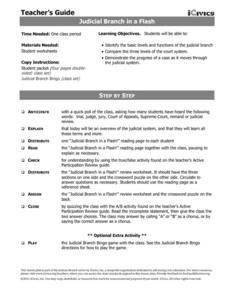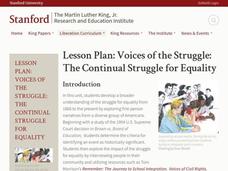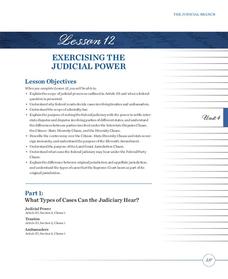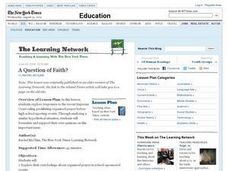Curated OER
Texas v. Johnson
Students examine the freedom of speech. In this Supreme Court lesson, students analyze primary documents from Texas v. Johnson and discuss the implications of the decision regarding flag burning.
Curated OER
Miranda v. Arizona (1966)
Students examine Miranda v. Arizona. In this court decisions lesson, students analyze the self incrimination case and read other supplemental articles about police procedures and due process. Students discuss the Supreme Court decision...
Curated OER
United States v. Nixon (1974)
Students examine checks and balances. In this Supreme Court lesson, students examine primary documents from United States v. Nixon and discuss the implications of the decision.
Curated OER
Dred Scott v. Sandford
Students examine the issues of slavery and due process. In this Supreme Court lesson, students examine primary documents from Dred Scott v. Sandford and discuss the implications of the decision.
Curated OER
The Juvenile Death Penalty
Sensitive material is discussed in this lesson. Please review to ensure that the content is suitable for your class. The topic is the Eighth Amendment and how the U.S. Supreme Court makes determinations about what constitutes cruel and...
State Bar of Texas
Baker v. Carr
Can the federal government override the state government to protect the citizens of the United States? The 1962 Supreme Court case Baker v. Carr outlines the issue of equal protection under the law. Scholars investigate with a short...
State Bar of Texas
Hernandez v. Texas
What if the jury is not made up of people from your ethnicity or background—are they still considered your peers? Scholars analyze the impact the Supreme Court case Hernandez v. Texas had on jury selection across the nation. Paired...
State Bar of Texas
Grutter v. Bollinger
A university decides not to allow a qualified scholar to enter its institution based on skin and gender—but this case is about a white female? The 2003 Supreme Court case Grutter v. Bollinger lays the foundation for open discussion and...
State Bar of Texas
Schenck v. US
Freedom of speech is absolute—or is it? The Supreme Court case Schenck v. United States has learners research what free speech really looks like. A short video along with paired work creates open discussion and thought on what speech is...
Federal Judicial Center
Amistad and Dred Scott—a Comparative Activity
What do slaves fighting for their freedom on board a ship and a slave fighting for his freedom in a courtroom have in common? Budding historians investigate the two different cases of the Amistad slave revolt and the Dred Scott argument....
K20 LEARN
Worcester v. Georgia: Cherokee Sovereignty and Actions of the U.S. Government
Young historians study the Supreme Court case "Worcester v. Georgia" and note instances where the Justices defended the sovereign rights of the Cherokee. They also examine the actions of President Andrew Jackson and the provisions of...
Curated OER
Indiana Courts: How Do They Work?
Young scholars identify the branches of Indiana's judicial system and determine the differences between the different courts and different types of cases. Students create a flow chart showing how a court case works its way through the...
iCivics
Judicial Branch in a Flash
What is the difference between the federal court and state court systems? What about criminal versus civil cases? Check out this resource that will offer your class members a general and effective overview of the judicial branch in the...
Judicial Learning Center
About Federal Judges: Qualifications of Judges
"Help Wanted: A Supreme Court Justice." What should be included in the ad? Learners ponder the question during a lively activity that asks them to examine the qualifications for various federal offices and then create job postings....
National Woman's History Museum
The Equal Rights Amendment
The debate over the Equal Rights Amendment continues. To better understand the controversy, class members research the history of attempts to get the amendment ratified. In addition, pairs engage in a structured academic conversation...
Curated OER
Courts in the Classroom: Ritter v Stanton
Students read the case briefs of Ritter v Stanton. They simulate the trial with classmates taking various parts such as appellant, appellee, bailiff, and justices. After conducting a mock argument, they write their own opinion for the case.
Curated OER
Marbury v. Madison (1803)
Students examine federalism and judicial review. In this Supreme Court lesson, students examine primary documents from Marbury v. Madison and discuss the implications of the decision.
Stanford University
Voices of the Struggle: The Continual Struggle for Equality
As part of a study of the Civil Rights Movement from 1868 to the present, class members examine first person narratives, the Supreme Court case Brown v. Board of Education, and other significant events in civil rights history. They then...
Heritage Foundation
Exercising Judicial Power
We should all do more exercising, but should the judicial branch as well? High schoolers develop their understanding of what powers the judicial branch carries because of the US Constitution, as well as where their limits lie in the...
Curated OER
Burning Hatred
Students examine the constitutionality of various forms of expression; they then take part in a mock trial on the issue of cross burning. Divide the class into three groups; Supreme Court Justices, and two groups that don't agree on this...
Curated OER
A Question of Faith?
Should organized prayer be prohibited at high school sporting events? Students explore their own feelings about prayer in school-sponsored events, before discussing the recent Supreme Court decision banning public prayer at high school...
Curated OER
What is Public Use?
Explore the Fifth Amendment by examining the meaning of "public use" as learners read a scenario and role play their assigned parts to determine "public use." They also read Supreme Court Cases regarding the amendment and present their...
K20 LEARN
Oklahoma and Segregation
It was not just the states of the Deep South that practiced segregation. Young historians investigate the history of segregation and desegregation in Oklahoma. They begin by reading, annotating, and analyzing an article about the impacts...
PBS
Ken Burns: Jackie Robinson - A Journey Back to Separate but Equal Conditions
Baseball great Jackie Robinson fought for social justice. His efforts to push for equal access are detailed in an episode from from the Ken Burns: The Jackie Robinson Collection. After viewing the clip, class members engage in a series...

























